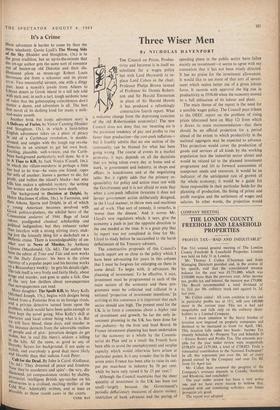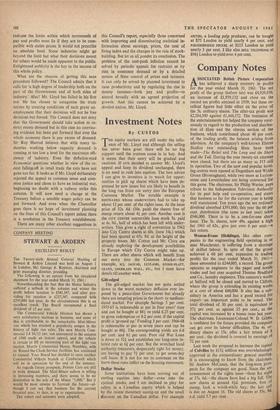Three Wiser Men
By NICHOLAS
DAVENPORT
THE Council on Prices, Produc- tivity and Incomes is in itself no substitute for a wages policy but with Lord Heyworth to re- place Lord Cohen in the chair, Professor Phelps Brown instead of Professor Sir Dennis Robert- son and Sir Harold Emmerson in place of Sir Harold Howitt it has produced a refreshingly constructive fourth report. What a welcome change from the depressing cynicism of the old Robertsonian economics! The new Council does not deny that our besetting sin is the persistent tendency of pay and profits to rise faster than production—the cost-push inflation--= but it frankly admits that no one section of the community can be blamed for what has been going wrong. The course of events in a market economy, it says, depends on all the decisions that are being taken every day at home and at work, in government and industry, in shops and offices. in boardrOoms and at the negotiating table. But it rightly adds that the primary re- sponsibility for policy and action must rest with the Govennient and it is not afraid to state that when a cost-push inflation threatens it does not favour government action deliberately designed, in the Lloyd manner, to throw men and machines out of work. That sort of remedy, it remarks, is 'worse than the disease.' And it scorns Mr. Lloyd's new regulators which, it says, give the economy a push in just the opposite direction to the one needed at the time. It is a great pity that its report was not completed in time for Mr. Lloyd to study before he succumbed to the harsh deflationism of his Treasury advisers.
The constructive proposals of this Council's fourth report are so close to the policy which I have been advocating for years in this column that I must be forgiven for enlarging on them in some detail. To begin with, it advocates the planning of investment. To be effective, it says, investment must be programmed in each of the main sectors of the economy and these pro- grammes must be collected and collated in a national 'projection of investment intentions.' In arriving at this consensus it is important that each sector should aim high. The present need for the UK is to form a consensus about a higher rate of investment and growth. So far the only in- vestment planning in the UK has been done for one ,industry—by the Iron and Steel Board. In France investment planning has been undertaken for the economy as a whole by the Commis- sariat du Plan and as a result the French have been able to avoid the unemployment and surplus capacity which would otherwise have arisen at particular points. is it any wonder that in the last seven years France has been able to raise its out- put per man-hour in industry by 50 per cent. while we have only raised it by 25 per cent.?
Although the Council maintains that the sheer quantity of investment in the UK has been too small—'-largely because the Government's periodic deflationary measures of dearer money, restriction of bank advances and the paring of, spending plans in the public sector have fallen mainly on investment—it seems to agree with my contention that it has not been wisely directed. It has no praise for the investment allowances. It would like to see more of that sort of invest- ment which makes better use of a given labour force. It records with approval the big rise in productivity in 1958-60 when the economy moved to a full utilisation of its labour and plant.
The main theme .of the report is the need for a sensible wages policy. The Council pays tribute to the OEEC report on the problem of rising prices (discussed here on May 12) from which it draws its main recommendation—that there should be an official projection for a period ahead of the extent to which productivity in the national aggregate may be expected to advance. This projection would cover the production of goods and services of all kinds by the working population (not the industrial sector alone) and would be related (a) to the planned investment programme and (b) to forward assessments of manpower needs and resources. It would be an indicator of the anticipated rate of growth of the whole economy; it would be a guide for those responsible in their particular fields for the planning of production, the fixing of prices and profit margins and the settlement of wages and salaries. In other words, the projection would indicate the limits within which movements of pay and profits must lie if they are to be com- patible with stable prices. It would not prescribe an absolute limit. Some industries might go beyond the limit but what their decisions meant for others would be made apparent to the public. Enlightened publicity is the key to the success of this whole policy.
What are the chances of getting this sane procedure followed? The Council admits that it calls for 'a high degree of leadership both on the part of the Government and of both sides of industry.' Alas! Mr. Lloyd has failed in his first test. He has chosen to antagonise the trade unions by creating conditions of such grave un- employment that their decisions will not be free decisions but forced. The Council does not deny that the Government should take action to re- strict excess demand but in this case no convinc- ing evidence has been put forward that over the whole economy there is any excess of demand. Sir Roy Harrod believes that with many in- dustries working below capacity demand is running at too low a level for the maximum effi- ciency of industry. Even the deflation-mad Economist questions whether in view of the re- cent falling-off in retail trade the cuts have not gone too far. It looks as if Mr. Lloyd deliberately rejected the appeal to common sense and com- mon justice and chose to have an industrial war, beginning no doubt with a railway strike this autumn. It will now need a change at the Treasury before a sensible wages policy can be put forward. And even when the Chancellor goes there is no hope of investment planning on the lines of this Council's report unless there is a revolution in the Treasury establishment.
There are many other excellent suggestions in
this Council's report, especially those concerned with improving and disseminating statistical in- formation about earnings, prices, the cost of living index and the changes in the rate of stock- building. But let us all ponder its conclusion. The problem of the cost-push inflation cannot be solved by periodic appeals for restraint or by cuts in consumer demand or by a detailed system of State control of prices and incomes. It can only be solved by planned investment to raise productivity and by regulating the rise in money incomes—both pay and profits—to accord broadly with an agreed projection of growth. And this cannot be achieved by a divided nation, Mr. Lloyd.



































 Previous page
Previous page